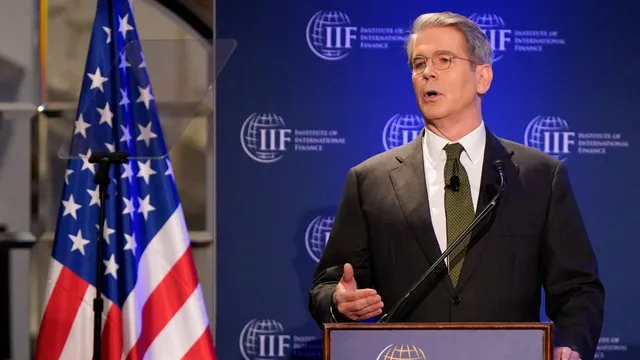
Scott Bessent expects de-escalation in U.S.-China trade war
2025-04-25 00:00- Scott Bessent addressed an investor summit in Washington, D.C., on April 22, 2025, stating that the trade war between the U.S. and China is unsustainable.
- He expects a de-escalation in tensions, noting both countries are aware their current tariff levels cannot remain in place.
- Bessent's comments have resulted in a positive market response, with significant upticks in stock values.
Express your sentiment!
Insights
In Washington, D.C., U.S. Treasury Secretary Scott Bessent addressed an investor summit hosted by JPMorgan Chase on April 22, 2025. Bessent stated that the ongoing tariffs between the United States and China are unsustainable for both economies, emphasizing that a de-escalation of tensions is expected in the 'very near future'. Both nations have implemented high tariffs on each other's goods, with the U.S. imposing a 145% tariff on Chinese imports, while China retaliated with 125% duties on American products. Bessent acknowledged that negotiations are yet to formally start, but he believes that both sides understand the current situation cannot remain unchanged. The stock market responded positively to Bessent’s remarks, with significant gains observed following the announcement. Investors were heartened by the prospect of easing trade tensions, which had been contributing to market volatility and economic uncertainty. Moreover, Bessent noted that high tariffs have already impacted economic growth and increased inflationary pressures. Amid the backdrop of elevated tariffs and heightened regulatory scrutiny against Chinese companies, concerns over a forced delisting of Chinese stocks from U.S. exchanges have also emerged, further complicating the financial landscape. Despite the positive outlook presented by Bessent, he warned that achieving a comprehensive trade deal will take time due to the complexity of negotiations. The Trump administration's approach includes efforts to engage with various global trading partners as part of a broader strategy aimed at reducing trade imbalances. As discussions continue, both the United States and China have signaled a willingness to reevaluate their positions, suggesting that a compromise could be possible. The ongoing trade war has affected various sectors and led to a significant slowdown in economic activity, prompting calls from market analysts for swift resolutions. With the uncertainty surrounding tariffs, investors are closely monitoring developments that could affect market stability. Overall, many stakeholders continue to advocate for a balanced approach that considers both nations' interests while aiming for a mutually beneficial and sustainable economic relationship.
Contexts
The impact of tariffs on the U.S. economy has been a significant topic of discussion among policymakers, economists, and businesses. Tariffs, which are taxes imposed on imported goods, can influence domestic markets by altering prices, supply chains, and consumer behavior. Proponents of tariffs argue that they protect domestic industries from foreign competition, promote local manufacturing, and generate revenue for the government. However, critics contend that tariffs can lead to trade wars, increase costs for consumers, and disrupt global supply chains, ultimately hindering economic growth. It is essential to understand how these dynamics play out in practice to assess the broader implications of tariff policies on the U.S. economy. In recent years, the imposition of tariffs, particularly during the trade tensions between the U.S. and various countries, including China, has had mixed results. Certain industries, such as steel and aluminum, have benefited from protective tariffs, which led to job preservation and domestic investment. Conversely, other sectors, such as agriculture, have faced adverse effects due to retaliatory tariffs imposed by trading partners. The agricultural sector reported significant losses as foreign markets became less accessible and prices fluctuated due to overproduction and decreased demand. The consequential ripple effects across the economy reveal the interconnected nature of global trade and how tariffs can lead to unintended consequences affecting various stakeholders. Consumer behavior is also significantly impacted by tariffs. As imported goods become more expensive due to tariffs, consumers may either seek alternatives or absorb higher prices, leading to inflationary pressures. Industries reliant on imported materials may see increased production costs, resulting in higher prices for end consumers. Businesses often react by adjusting their pricing strategies, which can distort competition and create market inefficiencies. Additionally, small and medium-sized enterprises, which often have limited resources, are particularly vulnerable to these price fluctuations, as they may lack the capacity to absorb costs or adapt to changing market conditions swiftly. In conclusion, the impact of tariffs on the U.S. economy is multifaceted, balancing the protection of domestic industries against the potential harm to consumers and interconnected global markets. Tariff policies should be carefully considered for their broader economic implications while recognizing the short-term benefits and long-term challenges they present. Policymakers must ensure that the interests of all stakeholders, including consumers, industries, and the overall economy, are weighed to promote sustainable economic growth while maintaining competitive fairness in the global marketplace.